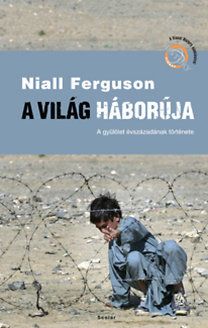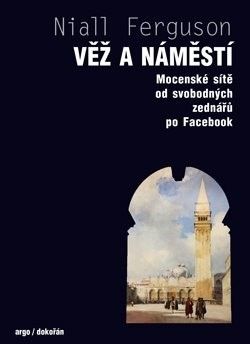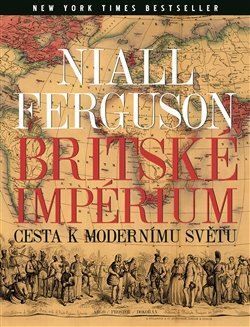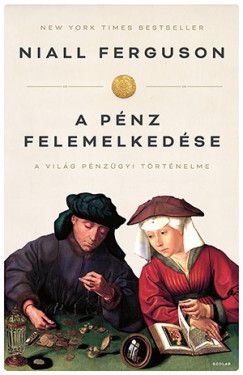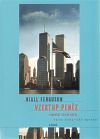Niall Ferguson
autor
A világ háborúja
Niall Ferguson a fiatal brit történésznemzedék egyik leghíresebb és szakmailag is legelismertebb képviselője. 1985-ben kitüntetéssel szerezte meg diplomáját Oxfordban, ahol 2000-ben a politikatudományok és a pénzügytörténet professzorává nevezték ki. Azóta oktatott a New York-i Stern Business Schoolban, a New York Egyetemen, valamint a Harvard és a Stanford Egyetemeken. Munkásságának sokszínűsége, olvasmányos stílusa, közérthető nyelvezete miatt gyakran hasonlítják a néhány éve elhunyt, Magyarországon is ismert brit történészhez, A. J. P. Taylorhoz. A világ háborúja alapján készült többrészes televíziós dokumentumfilm-sorozatot Magyarországon is bemutatták.
A XX. század az emberiség történetének messzemenően legvéresebb százada. A "gyűlölet évszázada" az első világháborút megelőző konfliktusokkal kezdődött, és a hidegháború utórezgéseinek számító háborúskodásokkal végződött. Hogyan magyarázható meg az erőszak megdöbbentő mértéke és hevessége, amikor a tudomány és a gazdaság fejlődésének köszönhetően az emberiség jelentős része jobban élt, mint korábban bármikor? Miért torkollhatott a fejlődés népirtásba? Mik voltak például a holokauszt okai? Niall Ferguson talán legjelentősebb könyvében a rá jellemző éleslátással, elevenséggel és eredetiséggel kísérli meg felfejteni, mi romolhatott el a modern kor beköszöntével. A történeti, gazdasági és evolúciós elméletek úttörő jellegű összekapcsolása révén "A világ háborúja" forradalmi módon újraértelmezi a modern kort.
Na sklade 1Ks
22,90 €
24,11 €
Věž a náměstí
Britský historik Niall Ferguson, autor řady vysoce oceňovaných publikací (naposledy např. Civilizace), ve své nové práci analyzuje podoby mocenského vlivu. Jednu vertilkální, hierarchickou charakterizuje metafora věže; druhou horizontální, založenou na síti vztahů zase obraz náměstí. Autor zkoumá jejich historický vývoj i koexistenci. V historických knihách je patrnější ona vertikální struktura, na jejímž vrcholu stáli králové a papežové, ale to neznamená, že by horizontální sítě společenských vztahů byly záležitostí moderní doby, ve které jako by komunikace po Facebooku hrála větší roli než politické uspořádání. Ferguson ukazuje podobu společenských sítí v minulých dobách a v jejich rozvoji a úpadku nachází varovné signály pro sítě novodobé, protože sítě byly vždy náchylné k uzavírání, přenášení negativních signálů či výpadkům.
A tér és a torony
A magyar olvasók előtt is ismert brit történész új munkájában leírja a világ és a történelem menetét befolyásoló globális hálózatok lényegét, melyek a hatalom megszerzésében és megtartásában mindig is óriási jelentőséggel bírtak. Míg a 18. századi misztikus illuminátusok meglepően hatástalan hálózatot építettek ki - bár az azóta is az összeesküvés-elméletek középpontjában áll -, addig a 20. században a Cambridge Egyetemen döbbenetesen hatékony szovjet kémhálózat működött... Ferguson egyaránt képes jó sztorikkal szórakoztatni és tudományos rendet vágni a sikeresen működő társadalmi hálók bonyolult szövevényében. Az összefüggések rávilágítanak napjaink működésének menetére, legyen szó az internet vagy a Facebook társadalomformáló hatásáról.
A világtörténelem fordulópontjainak ragyogó feldolgozása, beleértve a jelent is, mely a régi hatalmi hierarchiák és az új társadalmi hálózatok kialakulásának metszéspontjában áll.
The New York Times bestseller.
"Magával ragadó és meggyőző" -The New York Times
"Niall Ferguson ismét briliáns művet írt... 400 oldalban átformálja az elménket" - The Wall Street Journal
Végzet - A katasztrófa politikája
A katasztrófákat természetükből adódóan nehéz megjósolni. Egy-egy katasztrófa bekövetkeztekor azonban nem árt felkészültebbnek lennünk, mint annak idején a rómaiak voltak a Vezúv kitörésekor, vagy a középkori britek a pestis idején. Végül is ma már fel vagyunk vértezve a tudomány eredményeivel. Ennek ellenére 2020-ban a Kínából érkező új vírussal szemben számos fejlett nyugati ország nem tudott hatékonyan fellépni. Vajon miért? A Végzet számos diszciplína eredményeire építve nem csupán történelmi áttekintést nyújt a különféle katasztrófákról, hanem általános elméletet is alkot, és megmutatja, miért kezelik egyre rosszabbul a mindinkább bürokratikussá és összetetté váló politikai rendszerek a hirtelen jött csapásokat. A Végzet egy történelemlecke, amelyet az egész nyugati világnak sürgősen meg kell tanulnia, ha a következő súlyos válsággal szemben hatékonyabb fellépést várunk magunktól, és ha nem szeretnénk végleg és visszafordíthatatlanul lehanyatlani.
Na sklade 1Ks
23,75 €
25,00 €
Britské impérium
Ferguson líčí historii Britského impéria od 16. do 21. století. Impérium, které v době svého vrcholu ovládalo čtvrtinu světové populace, čtvrtinu zemského povrchu a téměř všechny oceány, se příznivě podepsalo na vývoji Spojených států a Kanady, Indie, Afriky, Austrálie, Nového Zélandu, východní Asie a Číny. Podle Fergusona impérium neožebračovalo národy, které se ocitly pod jeho nadvládou, ale naopak zajišťovalo jejich ekonomický blahobyt tím, že díky této nadvládě byly tyto země politicky stabilní. Idea svobody odlišovala impérium v minulosti od jeho evropských soupeřů, což se mj. projevilo během boje proti nevolnictví. Autor rovněž vyzdvihuje funkční efektivitu impéria. Například v Indii 900 civilních úředníků a 70 tisíc vojáků vládlo 250 milionům Indů.
Kniha pro českého čtenáře představuje nejen možnost seznámit se s dějinami, fungováním a dědictvím Britského impéria, ale zároveň jedinečnou příležitost korigovat obsah takových zažitých pojmů, jako je kolonialismus nebo vykořisťování. Díky této knize můžeme také lépe pochopit odstup, který si Velká Británie vždy udržovala od kontinentu i Evropské unie a který nakonec vyvrcholil brexitem. Publikace je vybavena rozsáhlým obrazovým materiálem, který působivě dokresluje charakter a atmosféru impéria v té které době a zemi.
Nové vydání světového bestselleru.
Civilizáció
Ha 1411-ben körbeutazhattuk volna a földet, leginkább talán a Kelet pezsgő civilizációi nyűgöztek volna le bennünket. A Mingek Pekingjében éppen a Tiltott Város építése zajlott, a Közel-Keleten pedig az oszmánok egyre inkább körbezárták Konstantinápolyt.
Ezzel szemben Anglia egy pestistől és állandó háborúktól sújtott, elmaradott térségnek tűnt volna, szörnyű higiéniai viszonyokkal. A többi civódó nyugat-európai királyság - Aragónia, Kasztília, Franciaország, Portugália és Skócia - sem tett volna ránk kedvezőbb benyomást. Az a gondolat, hogy a következő fél évezred jó részében a Nyugat uralja majd a többieket, merő képzelgésnek tűnt volna csupán. Pedig így történt.
Mi lehetett az a nyugat-európai civilizációban, ami lehetővé tette, hogy a fejlettebb keleti birodalmak fölé emelkedjen? Niall Ferguson szerint a válasz a Nyugat hat "gyilkos alkalmazásában" keresendő, amelyek nem mások, mint a verseny, a tudomány, a tulajdon, az orvostudomány, a fogyasztás és a munka.
Manapság a kulcskérdés az, vajon a Nyugat elveszítette-e a monopóliumát ezeken a területeken. Amennyiben igen, elképzelhető, hogy a Nyugat fénykorának végére értünk, figyelmeztet Ferguson.
Civilizáció című mű különleges világkörüli utazásra hívja olvasóit: a nankingi Nagy- csatornától az isztambuli Topkapi palotáig; az Andokban fekvő Machu Picchutól a namíbiai Shark-szigetig, Prága büszke tornyaitól Vencsou számos titkos templomáig. Vitorlásokról, hittérítőkről, földtulajdonosi okiratokról, oltásokról, a farmernadrágról és a kínai bibliákról szól ez a történet. A modern világtörténelem meghatározó narratívája.
A pénz felemelkedése (4. kiadás)
Niall Ferguson a rá jellemző lelkesedéssel és közérthetőséggel magyarázza el az olvasó számára, hogy a francia forradalom okait miért abban a tőzsdei buborékban kell keresnünk, amely egy elítélt skót gyilkos miatt alakult ki. Hasonlóképpen azt is bemutatja, hogy a világ hatodik leggazdagabb országának tartott Argentína a pénzügyi kudarcok eredményeként miként vált mára infláció tépázta csődtömeggé, és a pénzügyi forradalomnak köszönhetően hogyan válik a világ legnépesebb, de szegény országa egyetlen generáció alatt világhatalommá.
A pénzügyi történelem legfontosabb tanulsága azonban az, hogy előbb-utóbb minden buborék kipukkad, a mérleg a pesszimista eladók oldalára billen, és a mohóságot félelem váltja fel. Ezért akárhogy megy is éppen a sorunk, a pénz történetét most a legaktuálisabb megismerni.
Na sklade 1Ks
26,70 €
28,10 €
Doom: The Politics of Catastrophe
A compelling history of catastrophes and their consequences, from 'the most brilliant British historian of his generation' (The Times)
Disasters are inherently hard to predict. But when catastrophe strikes, we ought to be better prepared than the Romans were when Vesuvius erupted or medieval Italians when the Black Death struck. We have science on our side, after all. Yet the responses of many developed countries to a new pathogen from China were badly bungled. Why?
While populist rulers certainly performed poorly in the face of the pandemic, Niall Ferguson argues that more profound pathologies were at work - pathologies already visible in our responses to earlier disasters.
Drawing from multiple disciplines, including economics and network science, Doom: The Politics of Catastrophe offers not just a history but a general theory of disaster. As Ferguson shows, governments must learn to become less bureaucratic if we are to avoid the impending doom of irreversible decline.
A tér és a torony: A szabadkőművességtől a Facebookig
"A magyar olvasók előtt is ismert brit történész új munkájában leírja a világ és a történelem menetét befolyásoló globális hálózatok lényegét, melyek a hatalom megszerzésében és megtartásában mindig is óriási jelentőséggel bírtak. Míg a 18. századi misztikus illuminátusok meglepően hatástalan hálózatot építettek ki - bár az azóta is az összeesküvés-elméletek középpontjában áll -, addig a 20. században a Cambridge Egyetemen döbbenetesen hatékony szovjet kémhálózat működött... Ferguson egyaránt képes jó sztorikkal szórakoztatni és tudományos rendet vágni a sikeresen működő társadalmi hálók bonyolult szövevényében. Az összefüggések rávilágítanak napjaink működésének menetére, legyen szó az internet vagy a Facebook társadalomformáló hatásáról.
A világtörténelem fordulópontjainak ragyogó feldolgozása, beleértve a jelent is, mely a régi hatalmi hierarchiák és az új társadalmi hálózatok kialakulásának metszéspontjában áll.
The New York Times bestseller."
Vzostup peňazí
Bubáky, fuky, love, prachy, šupy. Nazývajte si ich, ako chcete, dnes na nich záleží viac ako kedykoľvek predtým. Vo Vzostupe peňazí známy britský historik Niall Ferguson ukazuje, že za celou históriou treba vidieť dejiny financií. Od bankárskej dynas
tie, ktorá financovala taliansku renesanciu, až po bublinu na akciovom trhu, kotrá zapríčinila Francúzsku revolúciu, je to rozprávanie o konjunktúrach a krachoch, o akých sa predtým nehovorilo. Nikdy nebol vhodnejší čas pochopiť vzostup a pád peňazí,
ako vo chvíli, keď sa svet zmieta v najväčšej finančnej kríze od Veľkej hospodárskej krízy.
Vypredané
15,20 €
16,00 €
Vzestup peněz
Britský historik Niall Ferguson (*1964) je profesorem na Harvardově univerzitě. Většina jeho prací, jež v západní Evropě vzbudily nebývalý zájem, je věnována hospodářským a sociálním dějinám 19. a 20. století. Největší pozornost prozatím vzbudila jeho kniha o příčinách první světové války (Nešťastná válka). V ní přišel s kacířskou tezí, že mocensko-politické vztahy v roce 1914 neeskalovaly kvůli německé agresivní, velmocenské politice, nýbrž kvůli nekompromisním postojům Velké Británie. Jeho další kniha nazvaná Vzestup peněz je věnována problematice rozvoje moderního finančního hospodářství, měnového systému a ekonomickým recesím a depresím v 19. a 20. století. Ferguson si v ní klade dvě základní otázky: Jakým způsobem moc peněz změnila mentální chování moderních lidí 19. a 20. století a jak ekonomika ve svém důsledku zvítězila nad politikou klasického 19. věku? Jeho odpovědi, někdy provokativní, ve svém důsledku osvětlují nejen vzestup moci peněz v moderních dějinách, ale také přičiny finanční krize, do níž se svět dostal v roce 2009.
Válka světa
Dvacáté století, od konfliktů, jež zvěstovaly příchod 1. světové války, po dozvuky války studené, je jednoznačně nejkrvavějším stoletím dějin člověka. Jak vysvětlit ten ohromný rozsah a intenzitu násilí v době, kdy na tom byla většina lidí díky vědeckým a ekonomickým pokrokům lépe než kdykoli předtím? Proč se pokrok zvrhl v genocidu? Ferguson hledá řešení paradoxu věku nenávisti, pátrá po vysvětlení, co se to s naší dobou vlastně stalo. Byla to epocha zmítaná ekonomickými zvraty, multikulturní společenství se rozpadala pod náporem konjunktur a krachů. Byl to také věk otrávený představou o nesmiřitelných rasových rozdílech. Především to však bylo období zápasu rozkládajících se starých impérií s kořistnickými mladými říšemi. Kdo ve válce světa zvítězil?
Vypredané
26,57 €
27,97 €
Colossus
Britský historik Niall Ferguson, známý našim čtenářům knihou Nešťastná válka, přichází ve své nejnovější knize Colossus s provokativní tezí: nevytýká Americe, že je imperialistická, ale že je imperialistická málo. V době globálních hrozeb a „krachujících států“ je nový, liberální imperialismus právě to, co svět potřebuje.
Vypredané
21,57 €
22,70 €
Nešťastná válka
První světová válka byla jednou z nejtragičtějších a současně nejvýznamnějších událostí 20. století a kniha Nešťastná válka zpochybňuje téměř všechny zažité představy o jejích příčinách a následcích. Proto se záhy po svém vydání stala událostí v historické literatuře. Autor dokládá, že k Velké válce došlo výhradně vinou Británie, která do ní vstoupila na základě naivních představ o německých záměrech. Z kontinentálního konfliktu se stala válka světová, kterou Británie vedla tak nekvalifikovaně, že si to vynutilo zásah Spojených států. Válka nebyla vůbec nevyhnutelná, došlo k ní díky chybným rozhodnutím vedoucích činitelů, kteří se později zbavili odpovědnosti tvrzením, že se stali obětí neosobních, historických sil. Celá válka byla pošetilostí s katastrofálními následky, většina mužů v ní však navzdory opačným tvrzením protiválečné literatury bojovala s nadšením. Zajímá-li vás, proč se vedou války, proč v nich muži tak rádi bojují a proč je dnešní svět takový, jaký je, nenajdete lepšího, pronikavějšího a inspirativnějšího průvodce než Fergusonovu Nešťastnou válku.
Vypredané
25,89 €
27,25 €
Colossus The rise and fall of the American empire
Is America the new world empire? Presidents from Lincoln to Bush may have denied it but, as Niall Ferguson's brilliant and provocative book shows, the US is the greatest military and economic colossus of all time. What's more, it always has been an empire, with its founding fathers battling westwards for territory and their successors spreading freedom across the world - at gunpoint if necessary. Yet is the US really equipped to play Atlas, bearing the weight of the world on its shoulders? America, Ferguson reveals, is now an empire running on empty, backing away from the crucial imperial commitments of time, money and manpower - and resting on perilous financial foundations. When the New Rome falls, its collapse may come from within.
Vypredané
9,45 €
9,95 €
Civilizáció
Ha 1411-ben körbeutazhattuk volna a földet, leginkább talán a Kelet pezsgő civilizációi nyűgöztek volna le bennünket. A Mingek Pekingjében éppen a Tiltott Város építése zajlott, a Közel-Keleten pedig az oszmánok egyre inkább körbezárták Konstantinápolyt.
Ezzel szemben Anglia egy pestistől és állandó háborúktól sújtott, elmaradott térségnek tűnt volna, szörnyű higiéniai viszonyokkal. A többi civódó nyugat-európai királyság - Aragónia, Kasztília, Franciaország, Portugália és Skócia - sem tett volna ránk kedvezőbb benyomást. Az a gondolat, hogy a következő fél évezred jó részében a Nyugat uralja majd a többieket, merő képzelgésnek tűnt volna csupán. Pedig így történt.
Mi lehetett az a nyugat-európai civilizációban, ami lehetővé tette, hogy a fejlettebb keleti birodalmak fölé emelkedjen? Niall Ferguson szerint a válasz a Nyugat hat "gyilkos alkalmazásában" keresendő, amelyek nem mások, mint a verseny, a tudomány, a tulajdon, az orvostudomány, a fogyasztás és a munka.
Manapság a kulcskérdés az, vajon a Nyugat elveszítette-e a monopóliumát ezeken a területeken. Amennyiben igen, elképzelhető, hogy a Nyugat fénykorának végére értünk, figyelmeztet Ferguson.
A "Civilizáció" című mű különleges világkörüli utazásra hívja olvasóit: a nankingi Nagy- csatornától az isztambuli Topkapi palotáig; az Andokban fekvő Machu Picchutól a namíbiai Shark-szigetig, Prága büszke tornyaitól Vencsou számos titkos templomáig. Vitorlásokról, hittérítőkről, földtulajdonosi okiratokról, oltásokról, a farmernadrágról és a kínai bibliákról szól ez a történet. A modern világtörténelem meghatározó narratívája.
Vypredané
13,79 €
14,52 €
